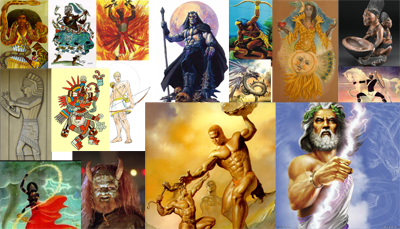by Dixon Wragg
WaccoBB.net
Column #15: Are You Certain?
The demand for certainty is one which is natural to man,
but is nevertheless an intellectual vice.
~ Bertrand Russell
Doubt is not a pleasant condition, but certainty is absurd.
~ Voltaire
The minute one utters a certainty, the opposite comes to mind.
~ May SartonIn my last couple of columns (1), we've been looking at various forms of misinformation and fallacy that render dubious so much of what we think we're certain about. In this one, we'll look more closely at the nature—and limitations—of certainty itself.
First we must distinguish between what I call subjective certainty and justified certainty. Subjective certainty is the feeling that we're certain about something (to whatever degree). That's easy to come by; we all have subjective certainty about lots of things, and any idiot can have subjective certainty about anything no matter how unjustified that certainty is. Some even cite intense feelings of subjective certainty as evidence for the claim they're "certain" about. An honest look at the things we ourselves were once "certain" of, or the manifest silliness of some beliefs people claim certainty of, or the fact that many claims people are "certain" of are mutually contradictory, should make it clear that our feeling of certainty, no matter how strong, never constitutes evidence of truth.
A subset of subjective certainty is justified certainty. It's the certainty that's supported by good evidence, and the degree of justified certainty is determined by how good the evidence is. Another way to look at it is that subjective certainty is belief, while justified certainty is knowledge, with the understanding that belief is whatever we believe even if it's totally unsupported or even disproved, while knowledge is what we believe with reasonable evidence (2).
One source of confusion is people's thinking of certainty in absolutistic, either/or terms, as if we're either absolutely certain about something or we have no certainty at all. This is an unhelpful way to conceptualize it. Certainty is not really a simplistic either/or polarity; it's always a matter of degree and, as I hope to make clear, there's no such thing as absolute 100% certainty with no possibility of being mistaken. When I look back on things I used to tell myself I was absolutely certain about, I have to laugh—just as I laugh now at others' protestations of absolute certainty.
Let's look at an extreme example of seemingly appropriate absolute certainty: the notion that some things are given with absolute certainty in our direct experience, say for instance the apparent fact that I'm really sitting at my desk typing this. I'm willing to agree that I'm almost absolutely certain of that, to the point where it would be silly nit-picking to question it except in the context of a precise discussion of the limits of certainty. But having worked for about 20 years in mental health and having encountered hundreds of people whose bizarre delusions and hallucinations seemed like indisputable reality to them, I must acknowledge that, as a fallible human being, I may be wrong about anything at any time. Thus, my certainty that I'm really sitting here typing, which for all usual intents and purposes is "total, absolute certainty", in the context of a precise discussion must be recognized for what it really is: something that approaches, but doesn't quite reach, the absolute.
Years ago, when I got out of the Army and returned to St. Joseph, Michigan, some of my friends said "Dude, you should've been here a couple months ago! We had a rat poison party! We all ate rat poison (belladonna)—just the right amount so it wouldn't hurt us but we'd get high from it!" Dear readers, you can imagine my disappointment at having missed out on a rat poison party! They described to me some of what occurred at this party, such as one person lighting and smoking a nonexistent cigarette, and another person carrying on an animated conversation with someone sitting next to her—who wasn't really there! These people's experience was that something was obviously, absolutely certainly, true, given in their direct perceptions—and they were dead wrong. This is another example of hallucination--apparently sensory experience which seems to be of objectively existent referents but which is, in fact, imaginary (3).
While hallucination of whatever sort is more common than we may think, it's reasonable in most everyday situations to say, speaking casually, imprecisely, that we're "absolutely certain" of this or that—"I'm absolutely certain I'm sitting at my desk writing this column." But what complicates the issue of "absolute certainty" in often ugly ways is the fact that many of the things people claim absolute certainty about aren't at all like the example of my sitting at my desk; instead they're things which people don't reasonably have any substantial degree of certainty about, such as the rightness of their side in a dispute, or the existence of whatever god they may believe in. Contrary to some folks' interpretations of their experience, a god isn't something tangibly in the room with them like a lamp or another person; it's something they take on "faith" (wishful thinking), or on the word of someone they've chosen to invest authority in, or on the basis of their interpretations of the meaning underlying some observations. Since all of these processes can easily lead to false conclusions, they don't appropriately yield anything remotely approaching absolute certainty.
Such beliefs (such as religious dogma and similarly dogmatic secular beliefs) are among the last things someone could appropriately hold with absolute certainty, yet they are among the most common beliefs to be asserted with such supposed certainty! How can we account for that? In addition to our universal human tendency to overestimate the appropriate level of certainty for any of our beliefs, I see a couple of factors in play here.
One is denial of uncertainty. When, however unconsciously, we fear that a belief that is important to us may be wrong, we tend to exaggerate our certainty as a way of suppressing our doubt. Exaggerated certainty is only one of many defense mechanisms triggered by doubt.
Also, there is the social demand for certainty. Shared belief is one of the main glues that hold communities together and the stronger the certainty, the stronger the glue. In many situations, he or she who expresses the strongest certainty is seen as the most righteous, inspiring and comforting one, so exaggerating one's certainty is correspondingly rewarded. I remember when I was a Mormon sitting in church services wherein we took turns "testifying", which mostly meant professing certainty about the shared beliefs. We used to say things like "I know Mormonism is the one true church without a shout of a doubt!", thus mutually giving comfort and reinforcing group cohesion by supporting one another in repressing our doubt. In subcultures wherein the degree of certainty is more appropriate to the quality of the evidence, such as science, there is a lot less need for "testifying", and, at least when scientists are speaking precisely, rarely any assertion of absolute certainty. In fact, much of science is about making reasonable estimates of how certain we should be about this or that conclusion—and it's never 100%.
In extreme cases, of which history up through the present unfortunately gives plenty of examples, we see people shoring up their "certainty" by misusing laws and other policies to enforce the illusion of agreement even among non-believers, as in including "under God" in the Pledge of Allegiance and "In God we trust" on currency. Worse, we see people enforcing the illusion of agreement by forcing others to convert at sword- or gunpoint, as Christians and Muslims, among others, have notoriously done. All of this can be understood as defense mechanisms whereby people repress their (quite appropriate) doubt by exaggerating their certainty, even to the point of gross brutality and oppression.
So, I believe that strictly speaking there is never such thing as appropriate 100% absolute certainty that does not allow for any possibility of being mistaken. Many claims are reasonably so close to being certain that the distinction between that and "absolute" certainty is academic, but most of the beliefs people are actually fighting and oppressing one another over don't appropriately come anywhere near absolute certainty. The natural psychological need for security impels us to tell ourselves that we're 100% certain of this or that and can't possibly be wrong, but our better natures ought to resist. Absolute certainty is absolute closed-mindedness.
One thing most people have never considered is that, if you have even one belief about which you think you're 100% certain, with no possibility whatsoever of being wrong, you are making a claim about yourself! You are saying that, at least regarding that belief, you're infallible; you're exempt from the universal human possibility of being mistaken. That's basically what the Catholics call "papal infallibility", and if you have any beliefs at all about which you won't admit any possibility of being wrong, that's what you're claiming! Would it seem too harsh for me to label that both arrogant and closed-minded?
But it gets worse! Note that if you're incapable of admitting any doubt of your belief but ask others to accept it, you're asking them for considerable open-mindedness—the willingness to doubt their own beliefs so they can accept yours—while refusing to bring the same open-mindedness to the table yourself. This creates a "one-up/one-down" relationship which is fundamentally insulting and degrading to the "one-down" person, and which is usually a feature of proselytizing situations. It also violates the Golden Rule. Clearly, such an attitude represents a woeful lack of the virtue known in the Critical Thinking community as "Intellectual Humility".
Speaking as an ex-Mormon and ex-fundamentalist (Christian variety), I can report that a huge selling point for such dogmatic belief systems is the promise of absolute 100% certainty which banishes all doubt. But doubt, of appropriate kind and degree, is a good thing; it helps keep us in touch with reality. Absolute certainty, on the other hand, is chimerical; it doesn't, and couldn't possibly, exist. "True believers" will offer a choice between the absolute certainty of their belief system and the uncertainty of anything else. But don't be fooled; the real choice is between phony absolute certainty and real uncertainty (i.e., varying degrees of certainty based on realistic assessment of the quality of the evidence). The former is the choice of unfortunate psychotics and self-deluding fanatics. The latter is the choice of those with the maturity and integrity to face life's uncertainty and ambiguity honestly, and make of it the best they can. After all, it's the only reality in town.
Of course, I'm not absolutely certain about any of this--just certain enough to believe it unless someone shows me I'm mistaken.
NOTES
1. "The Tangled Web of Lies" and "Onward Through the Fog!".
2. I intend to devote next month's column to the subject of belief, so stay tuned!
3. The word "hallucination" is often used loosely in ways that cause confusion. For instance, so-called "hallucinogens" such as LSD commonly create sensory distortions (changes in the way things which are actually present are perceived, such as enhancement of the sound of music which is actually playing, or changes in the appearance of someone who is actually there), and eidetic images (images which are viewed against the background of closed eyelids or the ceiling as if one were watching a movie, without thinking the images are actually physically present objects). Hallucinations in the precise sense of the word—imaginary percepts which are mistaken for objective reality—are rarely reported with most so-called (and inappropriately named) "hallucinogens". This confusion is unfortunate, as it suggests an unrealistically high level of danger in such drugs, which is taken as justification for oppressive laws criminalizing those who use them.
About Dixon: I'm a hopeful monster, committed to laughter, love, and the Golden Rule. I see reason, applied with empathy, as the most important key to making a better world. I'm a lazy slob and a weirdo. I love cats, kids, quilts, fossils, tornadoes, comic books, unusual music, and too much else to mention. I’m a former conservative Christian, then New Ager, now a rationalist, skeptic and atheist. I've won awards for my short fiction, short humor, and poetry (both slam performances and "old school")--as well as this column! Lately I’m a Workshopping Editor at the Omnificent English Dictionary In Limerick Form (That’s right!). I’m job-hunting too, mostly in the Human Services realm. Passions: Too many -- Reading, writing, critical thinking, public speaking, human rights, sex and sensuality, arts and sciences, nature. Oh, and ladies, I’m single ;^D
-
 Bulletin Board
Quick Nav
Bulletin Board
Quick Nav

- Bulletin Board
- Sonoma County Bulletin Board
- General Community
- Article: The Gospel According to Dixon #15: Are You Certain?
So Long and Thanks for All the Fish!
This site is now closed permanently to new posts.We recommend you use the new Townsy Cafe!
Click anywhere but the link to dismiss overlay!
- Share this thread on:
- Follow: No Email
-
Thread Tools
-
Search Thread
-
Dixon

-
Real Name: (not displayed to guest users)
-
Join Date: Jul 19, 2005
-
Location: Santa Rosa
- Expressed Gratitude: 3,784
- Received Gratitude 1,839 times for 685 posts
-
Last Online 01-31-2021
- View Profile
-
 Ignore
Ignore
-
 View Posts: (1,553)
View Posts: (1,553)
Article: The Gospel According to Dixon #15: Are You Certain?

Last edited by Dixon; 03-06-2014 at 09:16 PM.
-
-
alanora

-
Real Name: (not displayed to guest users)
-
Join Date: Jun 17, 2005
-
Location: guerneville
- Expressed Gratitude: 241
- Received Gratitude 32 times for 24 posts
-
Last Online 10-03-2020
- View Profile
-
 Ignore
Ignore
-
 View Posts: (441)
View Posts: (441)
-
-
podfish

-
Real Name: (not displayed to guest users)
-
Join Date: Aug 5, 2006
- Expressed Gratitude: 1,150
- Received Gratitude 3,643 times for 1,544 posts
-
Last Online 02-07-2021
- View Profile
-
 Ignore
Ignore
-
 View Posts: (2,239)
View Posts: (2,239)
Re: Article: The Gospel According to Dixon #15: Are You Certain?
sorry, Dixon, some logical fallacies here. You assert that a god isn't tangibly in a room with them. Christian tradition, at least, claims that such an event happened. Also, enumerating three processes that might lead to (their) conclusions is not the same as excluding any other potential process. There are people who make the claim of interaction with the divine, or spiritual experiences, that they don't have the tools to communicate to those who haven't had similar encounters. You can probably draw on your own experiences to find some that really can't be explained (think of "color" to a blind man, to be cliche'd).... people don't reasonably have any substantial degree of certainty about... the existence of whatever god they may believe in. Contrary to some folks' interpretations of their experience, a god isn't something tangibly in the room with them like a lamp or another person; it's something they take on "faith" (wishful thinking), or on the word of someone they've chosen to invest authority in, or on the basis of their interpretations of the meaning underlying some observations. Since all of these processes can easily lead to false conclusions, they don't appropriately yield anything remotely approaching absolute certainty.
I'm on your side, but your argument's got a couple of holes that Adam could ride a dinosaur through.
-
-
Hotspring 44

-
Real Name: (not displayed to guest users)
-
Join Date: Feb 19, 2008
-
Location: Redwood Valley, CA 95470
- Expressed Gratitude: 960
- Received Gratitude 1,141 times for 607 posts
-
Last Online 02-08-2021
- View Profile
-
 Ignore
Ignore
-
 View Posts: (1,334)
View Posts: (1,334)
Re: Article: The Gospel According to Dixon #15: Are You Certain?
 ...I'm on your side, but your argument's got a couple of holes that Adam could ride a dinosaur through.
...I'm on your side, but your argument's got a couple of holes that Adam could ride a dinosaur through.
-
-
Hotspring 44

-
Real Name: (not displayed to guest users)
-
Join Date: Feb 19, 2008
-
Location: Redwood Valley, CA 95470
- Expressed Gratitude: 960
- Received Gratitude 1,141 times for 607 posts
-
Last Online 02-08-2021
- View Profile
-
 Ignore
Ignore
-
 View Posts: (1,334)
View Posts: (1,334)
Re: Article: The Gospel According to Dixon #15: Are You Certain?
I have a theory that borders on "belief" that there is an "absolute constant" that exists throughout the "universe", I can only explain it as : "The only absolute constant is continuous change", I am almost "absolutely" 100% certain of it, but, if it is true that "The only absolute constant is continuous change", then it would be reasonably appropriate to say that by it's very nature, even that ("absolute constant") is not a " 100% absolute", certainty, it's only a "reasonable" certainty I have in my mind of that.
I think that because I am reasonably sure that I can point out numerous observations based from my personal perspective that anyone else that is somewhat scientifically knowledgeable and being reasonable would be able to "see"; such as aging, wear, the second law of thermal dynamics etc just to name a few; all of which are reasonably 99.999....% "factual"... but ...not necessarily, absolutely,100% factual. I could still be "mistaken" (incorrect) but I haven't been presented any reasonable, convincing evidence of it being nonexistent or something different.
-
-
Dixon

-
Real Name: (not displayed to guest users)
-
Join Date: Jul 19, 2005
-
Location: Santa Rosa
- Expressed Gratitude: 3,784
- Received Gratitude 1,839 times for 685 posts
-
Last Online 01-31-2021
- View Profile
-
 Ignore
Ignore
-
 View Posts: (1,553)
View Posts: (1,553)
Re: Article: The Gospel According to Dixon #15: Are You Certain?
Podster, thanks for your critique. But please note that "claims" do not constitute evidence, so the fact that my assertion runs afoul of Christians' claims doesn't render it invalid. If there were reason to believe that Christian claims of the tangible presence of God in the room with them were true, it'd be different. It's very plausible that the historical personage commonly called Jesus really existed and was tangibly present among others, but the claim that he was a god, or that such a being even exists, is, as far as I've been able to see, unfounded. If you have evidence to the contrary, whip it out. Otherwise, my point stands. And note also that I contrasted the notion of god being tangibly (i.e., physically touchably) in the room with a lamp or a person being there. The existence of lamps and persons is universally acknowledged, and examples of them can be produced upon demand and physically touched; this is not true of gods.
Of course not. Do you have any other processes you'd like to propose? If they seem real and relevant, I'll add them to the essay. Also, enumerating three processes that might lead to (their) conclusions is not the same as excluding any other potential process.
Also, enumerating three processes that might lead to (their) conclusions is not the same as excluding any other potential process.
Here you go invoking "claims" again. Podster, I'd argue that all experience is ineffable to varying degrees. The fact that someone can't be expected to explain very well an ineffable experience so others can assess its meaning doesn't mean that their interpretation of their experience as evidence of the "divine" is valid. I myself have had experiences which some would like to believe is evidence of some kind of god, but their interpretations are not the only possible explanations, and in fact never the best explanation, in my experience. There are people who make the claim of interaction with the divine, or spiritual experiences, that they don't have the tools to communicate to those who haven't had similar encounters. You can probably draw on your own experiences to find some that really can't be explained (think of "color" to a blind man, to be cliche'd).
There are people who make the claim of interaction with the divine, or spiritual experiences, that they don't have the tools to communicate to those who haven't had similar encounters. You can probably draw on your own experiences to find some that really can't be explained (think of "color" to a blind man, to be cliche'd).
Have we gone off onto a tangent of you trying to convince me of the existence of some sort of god? If so, invoking traditional Christian claims and peoples' ineffable experiences which they choose to interpret as evidence of the divine isn't gonna do the trick, LOL!Last edited by Barry; 02-13-2013 at 10:13 AM.
-
-
Dixon

-
Real Name: (not displayed to guest users)
-
Join Date: Jul 19, 2005
-
Location: Santa Rosa
- Expressed Gratitude: 3,784
- Received Gratitude 1,839 times for 685 posts
-
Last Online 01-31-2021
- View Profile
-
 Ignore
Ignore
-
 View Posts: (1,553)
View Posts: (1,553)
Re: Article: The Gospel According to Dixon #15: Are You Certain?
Dude, you may very well be right, although specifying it as the only absolute constant may be asking for trouble. Just keep in mind that change and permanence are two sides of the same coin--a Yin/Yang polarity like left/right, old/young, good/evil etc. etc. As such, they're mutually co-defining and reciprocally co-creating, so if change is an absolute constant, (relative) permanence must be too.
I have a theory that borders on "belief" that there is an "absolute constant" that exists throughout the "universe", I can only explain it as : "The only absolute constant is continuous change", I am almost "absolutely" 100% certain of it, but, if it is true that "The only absolute constant is continuous change", then it would be reasonably appropriate to say that by it's very nature, even that ("absolute constant") is not a " 100% absolute", certainty, it's only a "reasonable" certainty I have in my mind of that.
I think that because I am reasonably sure that I can point out numerous observations based from my personal perspective that anyone else that is somewhat scientifically knowledgeable and being reasonable would be able to "see"; such as aging, wear, the second law of thermal dynamics etc just to name a few; all of which are reasonably 99.999....% "factual"... but ...not necessarily, absolutely,100% factual. I could still be "mistaken" (incorrect) but I haven't been presented any reasonable, convincing evidence of it being nonexistent or something different.
-
-
Hotspring 44

-
Real Name: (not displayed to guest users)
-
Join Date: Feb 19, 2008
-
Location: Redwood Valley, CA 95470
- Expressed Gratitude: 960
- Received Gratitude 1,141 times for 607 posts
-
Last Online 02-08-2021
- View Profile
-
 Ignore
Ignore
-
 View Posts: (1,334)
View Posts: (1,334)
Re: Article: The Gospel According to Dixon #15: Are You Certain?
-
Gratitude expressed by 2 members:
Gratitude expressed by:
Gratitude expressed by:
Gratitude expressed by:
Gratitude expressed by:
Gratitude expressed by:
Gratitude expressed by:
- Site Areas
- Settings
- Private Messages
- Subscriptions
- Who's Online
- Search Categories
- Categories Home
- Categories
- Sonoma County Bulletin Board
- General Community
- Coronavirus
- Coronavirus Conspiracy Theories
- Events, Classes and Meetings
- Business Directory
- Sales & Timely Offers
- Services/Referrals Wanted
- Health & Wellness
- For Sale/Free/Wanted
- Employment Offered & Wanted
- Housing/Offices
- WaccoElders
- Housesitting/Petsitting
- Pets and other Critters
- Marin County Bulletin Board
- Discussion Board
- About WaccoBB
Thank you community!!!! (Next Thread) »
Similar Threads
-
Article: The Gospel According to Dixon #10: Evidence and Proof
By Dixon in forum General CommunityReplies: 0Last Post: 11-01-2011, 04:20 PM -
Article: The Gospel According to Dixon #8: Let's Argue!
By Dixon in forum General CommunityReplies: 8Last Post: 08-15-2011, 05:42 PM -
Article: The Gospel According to Dixon #7: Are You Open to This?
By Dixon in forum General CommunityReplies: 0Last Post: 07-12-2011, 09:51 PM -
Article: The Gospel According to Dixon #1: Let's Be Reasonable
By Dixon in forum General CommunityReplies: 33Last Post: 05-05-2011, 08:06 AM -
Article: The Gospel According to Dixon #2: Enlightenment
By Dixon in forum General CommunityReplies: 6Last Post: 02-16-2011, 11:12 PM
Bookmarks
-
 Facebook
Facebook
-
 Twitter
Twitter
-
 StumbleUpon
StumbleUpon
















